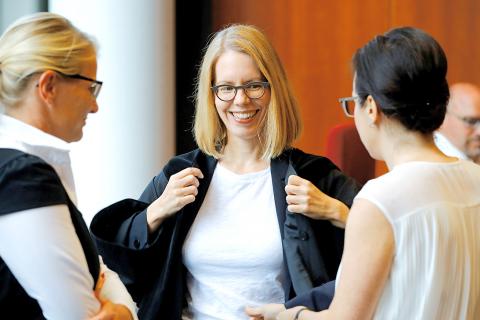Two British former investment bankers yesterday faced a German court in the first criminal trial relating to the “cum-ex” tax fraud scandal, which cost European treasuries billions of euros.
Martin S, 41, and Nicholas D, 38, have been charged on 33 counts of tax evasion and one count of attempted tax evasion, and stand accused of having deprived the state of about 440 million euros (US$485 million) of tax revenues since 2006.
The two men, former employees of UniCredit SpA subsidiary HypoVereinsBank, would be both defendants and key witnesses at the trial in Bonn, Germany, as they look to avoid or reduce a potential prison sentence of up to 10 years by cooperating with the authorities.

Photo: Reuters
Their testimonies in court are expected to shed more light on the complex workings of the so-called cum-ex tax fraud schemes, in which investors reclaimed tax which had never been paid.
First exposed in 2017, the scam involved numerous cooperating participants quickly exchanging stock in companies among themselves around dividend day to claim multiple tax rebates on a single payout.
Used across Europe, the practice cost Germany 7.2 billion euros, Denmark 1.7 billion euros and Belgium 201 million euros since 2001, according to an investigation published in October last year by big-name European outlets including German public broadcaster ARD and French newspaper Le Monde.
In Germany, a change to the tax law in 2012 closed the legal loophole exploited by the practice, although the German Ministry of Finance insists that it was effectively already illegal.
The trial in Bonn is just the tip of the iceberg, as prosecutors in Frankfurt, Cologne and Munich continue to investigate similar cases in the far-reaching scandal.
According to the Frankfurter Allgemeine Zeitung newspaper, about 100 people have been indicted, including bankers, stock traders, lawyers and financial consultants.
Among them is German lawyer Hanno Berger, who has been identified as the mastermind behind the fraudulent scheme and has been awaiting trial since May last year.
The Bonn trial, which is expected to run until January next year with 32 sitting days, would also involve one banking group and four capital management companies.
It is expected to further scrutinize the level of complicity among the financial actors caught up in the cum-ex network, such as the depositary banks responsible for claiming tax rebates on behalf of their clients.
A number of major international banks, including Banco Santander SA and Australian group Macquarie Bank Ltd, have been caught up in the German prosecutors’ investigations.
There have also been raids on Deutsche Bank AG and the German offices of mammoth asset manager BlackRock Inc.
HypoVereinsBank has agreed to repay 113 million euros to German tax authorities and pay a fine of 5 million euros.
Last week, officials also raided securities depository Clearstream, a subsidiary of German stock exchange operator Deutsche Boerse AG.
In May last year, a German court ordered French bank Societe Generale SA to pay 23 million euros of damages to German regional public bank Helaba over fraudulent cum-ex deals.
The French bank is appealing the sentence in civil proceedings expected to open next month.

SEMICONDUCTORS: The German laser and plasma generator company will expand its local services as its specialized offerings support Taiwan’s semiconductor industries Trumpf SE + Co KG, a global leader in supplying laser technology and plasma generators used in chip production, is expanding its investments in Taiwan in an effort to deeply integrate into the global semiconductor supply chain in the pursuit of growth. The company, headquartered in Ditzingen, Germany, has invested significantly in a newly inaugurated regional technical center for plasma generators in Taoyuan, its latest expansion in Taiwan after being engaged in various industries for more than 25 years. The center, the first of its kind Trumpf built outside Germany, aims to serve customers from Taiwan, Japan, Southeast Asia and South Korea,

Gasoline and diesel prices at domestic fuel stations are to fall NT$0.2 per liter this week, down for a second consecutive week, CPC Corp, Taiwan (台灣中油) and Formosa Petrochemical Corp (台塑石化) announced yesterday. Effective today, gasoline prices at CPC and Formosa stations are to drop to NT$26.4, NT$27.9 and NT$29.9 per liter for 92, 95 and 98-octane unleaded gasoline respectively, the companies said in separate statements. The price of premium diesel is to fall to NT$24.8 per liter at CPC stations and NT$24.6 at Formosa pumps, they said. The price adjustments came even as international crude oil prices rose last week, as traders

SIZE MATTERS: TSMC started phasing out 8-inch wafer production last year, while Samsung is more aggressively retiring 8-inch capacity, TrendForce said Chipmakers are expected to raise prices of 8-inch wafers by up to 20 percent this year on concern over supply constraints as major contract chipmakers Taiwan Semiconductor Manufacturing Co (TSMC, 台積電) and Samsung Electronics Co gradually retire less advanced wafer capacity, TrendForce Corp (集邦科技) said yesterday. It is the first significant across-the-board price hike since a global semiconductor correction in 2023, the Taipei-based market researcher said in a report. Global 8-inch wafer capacity slid 0.3 percent year-on-year last year, although 8-inch wafer prices still hovered at relatively stable levels throughout the year, TrendForce said. The downward trend is expected to continue this year,

Taiwan Semiconductor Manufacturing Co (TSMC, 台積電), which supplies advanced chips to Nvidia Corp and Apple Inc, yesterday reported NT$1.046 trillion (US$33.1 billion) in revenue for last quarter, driven by constantly strong demand for artificial intelligence (AI) chips, falling in the upper end of its forecast. Based on TSMC’s financial guidance, revenue would expand about 22 percent sequentially to the range from US$32.2 billion to US$33.4 billion during the final quarter of 2024, it told investors in October last year. Last year in total, revenue jumped 31.61 percent to NT$3.81 trillion, compared with NT$2.89 trillion generated in the year before, according to